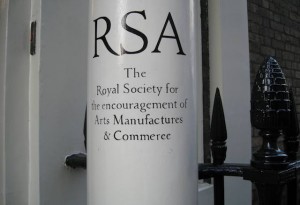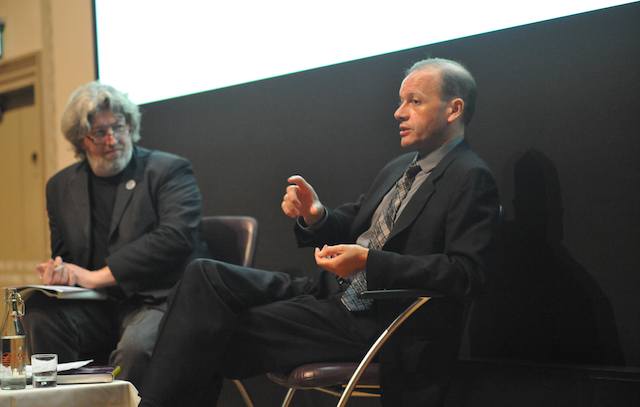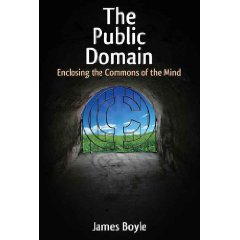Last night I went to the Royal Society of Arts (of which I am, ahem, a Fellow, don’t you know) for James Boyle’s lecture.
I’ve been reading his book which — as the event Chairman, Bill Thompson (left in photograph), observed — is beautifully written (unlike some other treatises on intellectual property that I could name). Perusing the list of attendees beforehand (it was a full house), James noted that it was dominated not by IP lawyers but by techies and ‘creative industry’ types, and wisely decided to go into storytelling rather than law-professor mode. The result: a riveting and thought-provoking event.
BillT is right: The Public Domain is a lovely book, gracefully written and persuasive. Its central themes are:
Boyle thinks that we need a movement (analogous to the environment movement) to protect and reverse the enclosure of the public domain.
Like me, JB is a great admirer of Macaulay. (Unlike me, he sometimes writes like him too.) The book has some lovely quotes from Mac’s speeches on copyright. He was particularly fierce against attempts to extend its term far beyond the death of the author — and particularly against the idea that literary legatees might choose to withdraw access to great works. Here he is, for example, on Boswell’s Life of Samuel Johnson.
One of the most instructive, interesting and delightful works in our language is Boswell’s Life of Johnson. Now it is well known that Boswell’s eldest son considered this book, considered the whole relation of Boswell to Johnson, as a blot on the escutcheon of the family. He thought, not perhaps altogether without reason, that his father had exhibited himself in a ludicrous and degrading light. And thus he became so sore and irritable that at last he could not bear to hear The Life of Johnson mentioned. Suppose that the law had been who my honourable and learned friend wishes to make it. Suppose that the copyright of Boswell’s Life of Johnson had belonged, as well it might, during sixty years to Boswell’s eldest son. What would have been the consequence? An unadulterated copy of the finest biographical work in the world would have been as scarce as the first edition of Camden’s Britannia.
Boyle argues that, in many respects, people like Thomas Jefferson and Macaulay got right to the heart of the matter. One couldn’t ask for a better refutation of the IP lobby’s arguments that extending IP rights incentivises authors (including dead ones) than this blast — again about Dr Johnson.
Dr. Johnson died fifty-six years ago. If the law were what my honourable and learned friend wishes to make it, somebody would now have the monopoly of Dr. Johnson’s works… Now, would the knowledge that this copyright would exist in 1841 have been a source of gratification to Johnson? Would it have stimulated his exertions? Would it have once drawn him out of his bed before noon? Would it have once cheered him under a fit of the spleen? Would it have induced him to give us one more allegory, one more life of a poet, one more imitation of Juvenal? I firmly believe not. I firmly believe that a hundred years ago, when he was writing our debates for The Gentleman’s Magazine, he would very much rather have had twopence to buy a plate of shin of beef at a cook’s shop underground.
Shameless plug: James Boyle is coming to Cambridge to give the first Arcadia Lecture at my college. Details here. All welcome.



